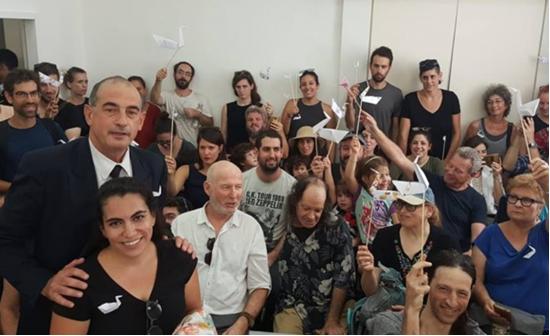Two weeks ago, Amir Dahan, the judge of the Jerusalem Magistrate Court, ruled in favor of the Jerusalem Municipality’s request to evict Barbur Gallery from the locale it has been operating from for the past 13 years. Judge Dahan admitted that there are political forces that have been trying to interfere with the exhibitions displayed at the gallery and silence the voices emanating from there and force it to close. Nevertheless, the judge decided to curtail the right to free speech even further and denied the gallery the right to defend itself and present its arguments, and ruled that it must vacate the premises by February 1, 2019.

Attorney Yossi Havilio, first from left, and Barbur Gallery supporters during the court proceedings (Photo: Barbur Gallery)
The Jerusalem municipality has targeted Barbur Gallery ever since, last February, it hosted a lecture by Breaking the Silence, the movement created by former Israeli combat soldiers who call for an end to occupation of the Palestinian territories. Breaking the Silence collects testimonies from former Israeli officers and soldiers who have taken part in or witnessed human rights violations committed against Palestinians in the West Bank and Gaza.
The organization has been the object of repeated virulent attacks by ring-wing lawmakers, who have accused its members of treason. It was further cited as the inspiration for a new bill by the Knesset that bans groups critical of the Israeli army from conducting lectures in public schools.
After the ruling by Judge Dahan, Israel’s far-right Minister of Culture, Miri Regev, a vocal critic of Breaking the Silence, said, “Barbur Gallery has given a platform to those seeking to undermine our values and symbols and I can only welcome its closure.” Regev was the driving force behind the municipality’s efforts to evict the gallery from its premises and, under her direction the Mayor of Jerusalem, Nir Barkat (Likud), utilized several tactics to avoid the negative image of limiting the gallery’s right to freedom of expression.
Yossi Havilio, a lawyer representing the gallery, said that the public’s faith in the judicial system could be shaken if a proper investigation is not conducted into the political motives behind the decision. Havilio, who is running for the position of Jerusalem mayor in the upcoming municipal elections in October, asked the court to postpone the decision until after the elections to allow a new mayor to decide on the gallery’s fate.
The Jerusalem Municipality’s lawsuit against the Barbur Gallery, and the decision by the magistrate court, has resulted in much anger and frustration among the city’s artist community of and lovers of art and culture. In the days leading up to and following the court hearing, several initiatives and groups have been formed with the aim of supporting the gallery and protesting its closure and infringing on its freedom of expression.
Towards the court hearing, a letter signed by dozens of heads of cultural organizations and institutions in Israel was sent to Jerusalem’s Mayor Barkat. In addition, around 550 artists signed a petition supporting the gallery and protesting its closure. On Thursday, September 6, the gallery hosted the Jerusalem launching of the Hebrew edition of Naomi Klein’s book No is Not Enough and a panel on civil disobedience. Yet another presentation and debate on Klein’s book was held in the alternative cultural and arts space “Hagada Hasmalit” in Tel Aviv.
Related:


